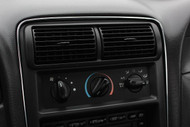How the Condenser Works in Automotive AC Systems
2nd Jun 2022
There's nothing worse than discovering that your vehicle's air conditioning (AC) system has stopped working in the middle of summer. Without a working AC system, you and your passengers will have some uncomfortably hot trips. Automotive AC systems, of course, feature many of the same components as residential AC systems. One of the most important components is the condenser. If the condenser fails, your vehicle's AC system will fail as well.
What Is the Condenser?
The condenser is a coil-based AC system component that's responsible for reducing the temperature of refrigerant. It's typically located near the radiator. You can find the condenser either in front of or behind your vehicle's radiator. As refrigerant travels through the condenser, it will become cooler.
How the Condenser Works
Automotive AC systems use refrigerant to create cool air. Not to be confused with coolant, refrigerant is a substance that cycles between a liquid and gas state.
Refrigerant will flow through your vehicle's AC system. While traveling through the evaporator coil, its temperature will increase. Refrigerant will absorb heat at this component, after which it will travel to the condenser. The condenser is where the refrigerant will release this heat. A fan will blow over the condenser so that the temperature of the refrigerant decreases.
Common Condenser Problems
Condensers can crack. Most vehicles now use an all-aluminum condenser. Aluminum is highly resistant to rust and corrosion, but it can still crack due to mechanical stress. If you accidentally hit a curb while driving, for instance, your vehicle's condenser may crack.
It only takes a hairline crack to allow refrigerant to leak out of your vehicle's AC system. Like residential AC systems, automotive AC systems are pressurized. If the condenser cracks, refrigerant will leak out. Your vehicle's AC system may still turn on with a cracked condenser. Assuming it's out of refrigerant or low on refrigerant, though, it won't blow cold air.
In addition to cracking and leaking, condensers can become clogged. Condensers look like radiators. They feature a series of tubes and fins. If the condenser becomes clogged with road debris, its performance will suffer.
Condensers are heat exchangers -- just like radiators. A clogged condenser means that the refrigerant will release remain hot. It won't release as much heat at the condenser, which could lead to AC system failure. To prevent it from becoming clogged, try to get into the habit of cleaning your vehicle's condenser at least once every few months.



